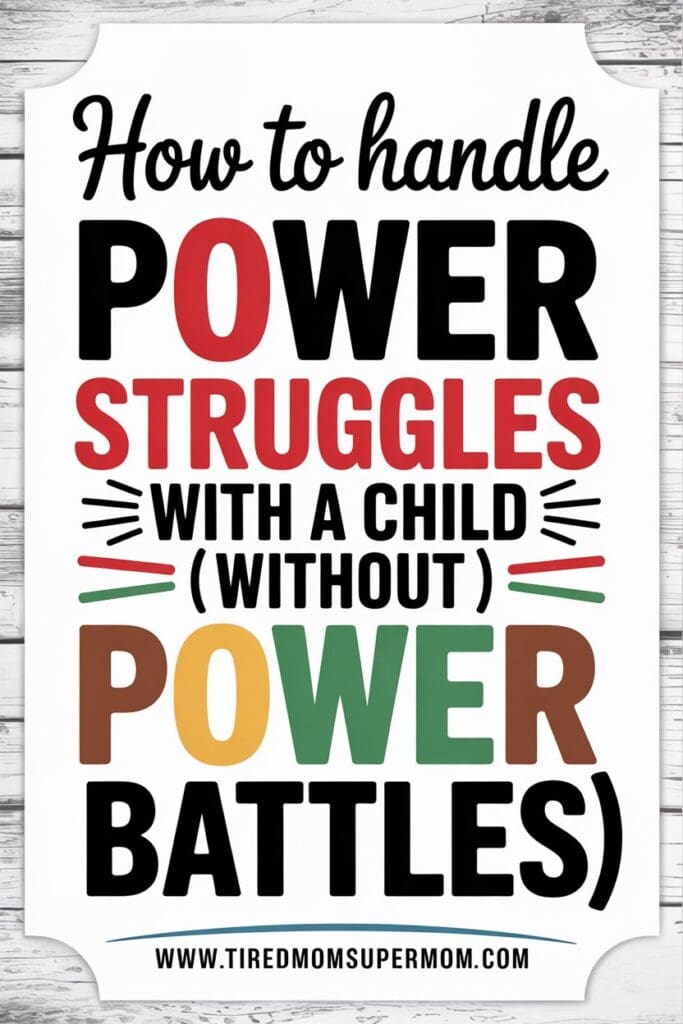7 Powerful Tips on How to Handle Power Struggles With a Child (Without Power Battles)
Parenting can feel like a constant test of patience, especially when it comes to daily battles over homework, bedtime, mealtime, and even getting dressed.
If you’re wondering how to handle power struggles with a child without losing your cool, you’re definitely not alone. Power struggles are a normal — but exhausting — part of parenting.
Thankfully, with the right strategies, you can prevent many battles before they begin and turn daily challenges into moments of growth and connection. Let’s dive into real-life solutions you can start using today.
Parents who practice techniques on how to handle power struggles with a child often notice less defiance and more emotional maturity over time.
Heads up: This post may include affiliate links. As an Amazon Associate, I earn from qualifying purchases—at no extra cost to you. Full privacy policy and disclosure here.

Understanding Why Power Struggles Happen
First, it’s important to realize that children aren’t misbehaving to make your life harder. Power struggles usually happen because:
- Kids crave independence.
- They want to feel a sense of control.
- They’re testing boundaries to understand the world.
- They’re feeling disconnected or misunderstood.
Developmentally, asserting independence is a huge part of childhood, especially between ages 2 and 8. Knowing this can help you shift your mindset: power struggles aren’t a sign you’re failing — they’re a sign your child is growing.
Read more about the 5 key elements of positive parenting to help build stronger connections and avoid constant conflict.
How to Handle Power Struggles With a Child Positively
Learning how to handle power struggles with a child starts with changing the dynamic from “me vs. you” to “we’re on the same team.”
One key to learning how to handle power struggles with a child is focusing on collaboration instead of control — working with your child, not against them.
Here are proven strategies:
1. Offer Limited Choices
Instead of barking orders, empower your child with two acceptable options.
Example:
“Do you want to brush your teeth first, or put on pajamas first?”
Giving choices helps children feel respected and reduces the need to fight back.
2. Use Positive Reinforcement
Catch them being good! Praise cooperation, effort, and problem-solving.
Helpful Tool:
We love using this positive behavior reinforcement chart — it makes good behavior feel like a fun challenge, not a chore.
If you’re looking for effective phrases, check out positive reinforcement phrase examples for kids.
3. Stay Calm and Regulate Yourself
Children mirror our emotions. If you escalate, they escalate.
Take a deep breath, kneel to their level, and speak calmly even if you’re frustrated.
A calm-down kit with stress balls and sensory tools can help kids (and parents!) find emotional balance faster.
Mastering how to handle power struggles with a child is a powerful parenting skill that not only reduces daily stress but also strengthens long-term emotional bonds.
Practical Tips for Managing Daily Power Struggles
Let’s get specific about common trouble spots:
Morning Routine Struggles
Mornings are tough because everyone is in a hurry.
Solutions:
- Prepare clothes and backpacks the night before.
- Use a visual morning checklist so your child knows the plan without constant nagging.
- Offer a simple choice: “Red shirt or blue shirt today?”
Mealtime Battles
Food can easily become a power struggle.
Solutions:
- Offer two choices: “Would you like broccoli or carrots?”
- Avoid “clean your plate” demands. Focus on encouraging, not forcing.
- Create a “serve yourself” night where kids make their own healthy plates.
This Healthy Children resource has more science-backed strategies.
Homework Meltdowns
Homework can trigger tears, resistance, and conflict.
Solutions:
- Set a timer and take short breaks.
- Use a child-friendly timer so the time limit feels manageable.
- Offer rewards for effort, not results.

When to Seek Help for Ongoing Power Battles
If you feel like every single day is filled with battles despite your best efforts, it might be time to get professional support.
Signs you may need help:
- Daily meltdowns last longer than 30 minutes.
- Aggression toward siblings, parents, or peers.
- Sleep problems, appetite changes, or frequent complaints of feeling “bad.”
Therapists specializing in child behavior can offer customized support.
Positive Parenting Solutions offers excellent online courses for parents in the trenches — including scripts for tricky situations.
Here’s why you’ll love the Positive Parenting Solutions course based on my personal experience!
How to Prevent Power Struggles Before They Start
Prevention is better than cure. Here’s how:
- Redirect Behavior Early: Instead of saying “no,” use distraction or redirection. Learn how to use redirection effectively here.
- Set Clear Expectations: Before entering a store, remind your child of the rules and consequences.
- Praise Effort Often: Make positive behavior the star of the show.
- Use Positive Language: Instead of “Don’t run!” say “Walk next to me, please.”
See more examples of positive phrases here.
Feeling stuck in daily power battles with your child?
Grab your free Power Struggle Survival Checklist and get simple, actionable steps you can use right away to bring more peace, cooperation, and connection into your home.
FAQ: Power Struggles With Children
What causes power struggles with a child?
Children seek independence and control. Power struggles happen when their need for autonomy clashes with your need for cooperation. Developmental stages like toddlerhood and early adolescence are hot spots for these clashes.
How can I stay calm during a power struggle?
Breathe deeply, validate your child’s feelings, and stay firm but kind. Tools like a calm-down area, deep breathing, or even squeezing a stress ball can help manage your own emotions.
What phrases help during a power struggle?
Phrases like “Let’s work together,” “What’s your idea?” and “I see you’re frustrated — let’s find a solution” keep the tone cooperative instead of combative.
Can positive reinforcement really stop power struggles?
Absolutely! When children feel recognized and respected for good behavior, they’re more likely to repeat it. Positive reinforcement teaches them that cooperation leads to good outcomes.
Should I punish my child after a power struggle?
Punishment often escalates resentment. Instead, focus on natural consequences and emotional coaching. Help your child reflect: “What could we do differently next time?”
Final Thoughts: Mastering How to Handle Power Struggles With a Child
Handling power struggles takes patience, empathy, and a toolbox full of strategies — but it’s absolutely doable.
Focus on offering choices, using positive reinforcement, and staying calm.
Remember, your child isn’t your opponent — they’re your teammate learning how to navigate a big, complicated world.
You don’t have to do it perfectly — you just have to stay connected.
Looking for a little extra help building cooperation habits?
Check out No-Drama Discipline — one of the most effective parenting books I’ve ever read!
Struggling with daily battles? Save these simple tips on how to handle power struggles with a child — and bring more peace to your home! 🌈👩👧👦

Have you dealt with power struggles in your parenting journey? Share your best tips or toughest moments below — let’s support each other with real solutions! 💬✨

You’re so awesome! I don’t believe I have read a single thing like that before.
So nice to discover somebody with original thoughts on this subject.
Really.. thank you for starting this up. This web site is one thing that is needed on the internet, someone with a little originality!